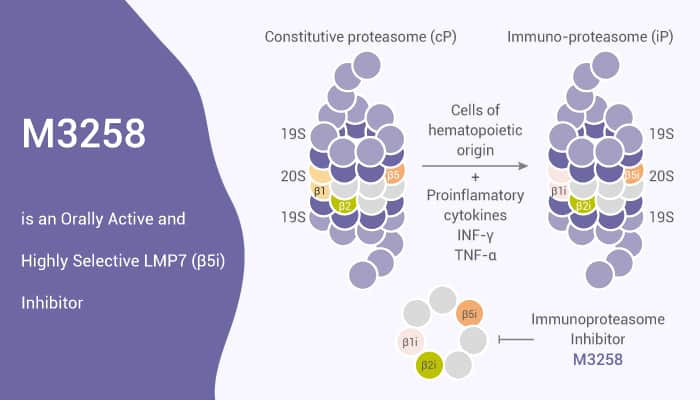The ubiquitin-proteasome system (UPS) plays an essential role in maintaining cellular homeostasis by degrading ubiquitinated proteins. The immunoproteasome and constitutive proteasome are multisubunit cylindrical complexes each containing three proteolytic subunits; large multifunctional peptidase 2 (LMP2/β1i/PSMB9), MECL-1 (LMP10/β2i/PSMB10), and LMP7 (β5i/PSMB8) in the immunoproteasome, replaced, respectively, by β1 (β1c/PSMB6), β2 (β2c/PSMB7), and β5 (β5c/PSMB5) in the constitutive proteasome. LMP7 is a proteolytic subunit of the immunoproteasome, which is predominantly expressed in normal and malignant hematolymphoid cells, including multiple myeloma, and contributes to the degradation of ubiquitinated proteins. In this study, M3258 is an orally bioavailable, potent, reversible, and highly selective immunoproteasome subunit LMP7 (β5i) inhibitor. It exerts high biochemical (IC50=3.6 nM) and cellular (IC50=3.4 nM) potency against the LMP7 subunit.

M3258 is a selective inhibitor of LMP7 delivering efficacy in multiple myeloma models.
M3258 leads to significant and prolonged suppression of tumor LMP7 activity and ubiquitinated protein turnover and the induction of apoptosis in multiple myeloma cells. Furthermore, it shows superior antitumor efficacy in selected multiple myeloma and mantle cell lymphoma xenograft models. M3258 inhibits human LMP7 with a mean IC50 of 4.1 nM. It also displays weak activity against the constitutive proteasome subunit β5. In addition, M3258 potently inhibits LMP7 in the human multiple myeloma cell lines MM.1S and U266B1 and in human, rat, and dog PBMCs with IC50s between 2-37 nM. M3258 also induces a >four-fold accumulation of ubiquitinated proteins with an EC50 of 1980 nM in MM.1S cells. In addition, M3258 interferes with immunoproteasome function. M3258 also induces apoptosis assessed by caspase 3/7 activity (EC50=420 nM;>3.5-fold induction) and reduces MM.1S cell viability (IC50=367 nM).
In summary, selective LMP7 inhibition is a novel and differentiated mechanism for targeting multiple myeloma cells. It represents a potentially attractive therapeutic strategy in this disease. Therefore, M3258 gains insights into the clinical utility of selective LMP7 inhibition in multiple myeloma.
Reference: